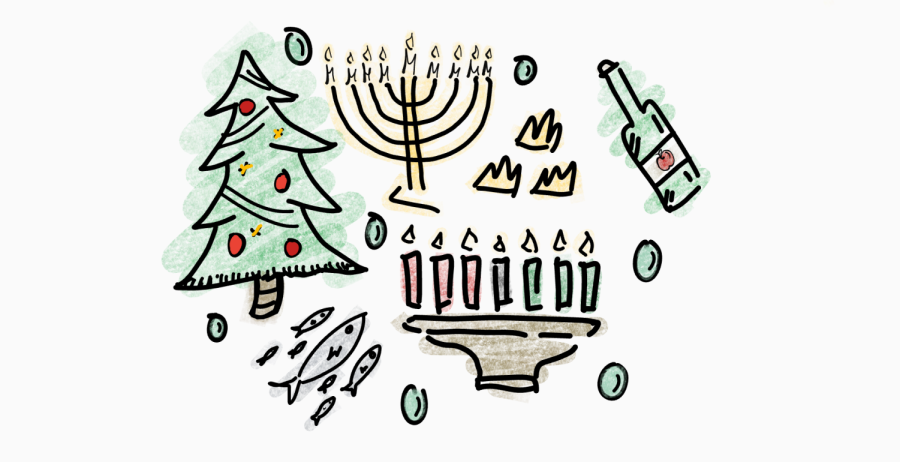Truths, Traditions, and Togetherness: A Guide Through the Holidays
December 15, 2021
As the sun sets on the eighth night, a family gathers together ready to end their celebration. The candles are set in their place, ready to share the flames between each other. Just before the fire touches the shammash, the Hebrew prayer begins, “Baruch atah adonai elohenu…” Down the street, another family dusts off boxes of ornaments and lights as they start decorating the tree. They carefully place all of the ornaments onto the branches of the tree and string the lights around them.
This time of year is home to many celebrations: like Hanukkah, Christmas, Kwanzaa, New Years, Chinese New Year, Eid, etc. It is also important to note that there are some people who do not celebrate holidays this time of the year, so keep in mind that not everyone celebrates, even if you do.
For many people, the holidays are a time to reconnect with family and celebrate important traditions and eat delicious food. It is the one time a year they see extended family, while students take time off of school and relax. No matter what you celebrate during these times, family is typically at the center of the celebrations.
A sophomore at Ida B. Wells plans on celebrating Thanksgiving, Christmas, and New Years surrounded by family. They plan to decorate a Christmas tree at their mom’s house with different flavors of candy canes and listen to Christmas music. a Christmas tree at their mom’s house, listening to Christmas music, and putting different flavored candy canes on the tree.
“When I was younger I celebrated with my dad every year.” This student said, “We would go get shrimp, and a whole bunch of snacks, and we would drink tons of sparkling cider. We would also get party horns to blow at 12 from the dollar tree. When the clock struck 12 we would go crazy blowing our horns and banging pots and pans.”
Traditions are a big part of family holidays. From watching Deadpool and eating chimichurris to having a big family dinner, every family has their own way of celebrating.
For example, 10th grader Sophie Darden says, “While we make Thanksgiving dinner, we always listen to ‘The White Album’ by the Beatles and ‘Alice’s Restaurant Massacre’ By Arlo Guthrie.”
Many people associate the holidays with food. Whether it be a big Thanksgiving meal, or potato latkes on Hanukkah, the significance of meals mixed with traditions is what makes the holidays special and unique for each family.
Sophomore Adriana Ching and her family eat 12 grapes for the last 12 seconds before the New Year.
Another student likes to make kale, black eyed peas, and cornbread for friends on New Year’s day. “We eat a meal containing seafood on Christmas Eve as a form of the Feast of the Seven Fishes, an Italian American tradition,” the student said.
Feast of Seven Fishes or La Vigilia is an Italian tradition where on Christmas Eve a family will eat a big feast consisting of fish and other seafood. This tradition is most popular in southern Italy and American Italian households; it originated from Catholics abstaining from meat in commemoration of waiting for the birth of Jesus.
Monica Luckman, a junior at IBW, says that for Christmas she and her family have a tradition from the Philippines where they hang up big piñata-like stars that light up Christmas colors. They also “buy a bunch of fruits like pineapple, kiwi, and all kinds of other fruits. All of these things are symbols of good luck for the year and you aren’t allowed to eat them until after New Years comes.”
Some people take the holidays as a time to give back to the community. Like senior Izzy Fitzpatrick, who gives bags of warm clothes and other essentials to the homeless people here in Portland.
There are more than 4,000 homeless people in Portland and 40% of them are not in shelters or do not have access to shelters. Because of this, it is so important to give back as the weather gets colder and the people on the streets have less resources. Fitzpatrick is proving that by taking this time to give back and benefit our community.
Another student that gives back during the holiday time is sophomore Eloise Fleshner, who makes care packages for children entering the foster care system. As of April 2021, there were almost 6,000 children in foster care. This time of year can be challenging for kids with struggles at home, so what Fleshner is doing really helps the children who need it.
Other holidays like Kwanzaa are vastly underrepresented and appreciated during the season. Unfortunately the population that celebrates this holiday has decreased. According to Public Policy polling, as of 2012, only 4% of Americans celebrate Kwanzaa.
The reason for this could be the deep seeded systemic racism in America since this is a traditionally African American celebration. Kwanzaa is largely ignored by the white population and therefore not widely acknowledged in America.
In an interview with NPR, Mark Anthony Neal, a professor of Black culture at Duke University, spoke about why there is a decrease in the amount of people who celebrate Kwanzaa. Neal says, “[Kwanzaa] was started during the moment of the Black freedom struggle,” he says, “so there was a lot of intensity around finding some way to express our Black pride within that context.”
Neal continues, “So you could imagine, for the millennial generation now, who sit in Black studies courses, who have so much more access to Black history and Black heritage…there’s just not that kind of intensity around the holiday that we might have saw in the 1980s.”
Kwanzaa is celebrated from December 26 through January 1. Although every family celebrates this African American holiday differently, typically it includes songs, dances, African drums, storytelling, and traditional meals. During Kwanzaa there are 7 principles, Umoja (unity), Kujichagulia (self-determination), Ujima (collective work and responsibility), Ujamaa (cooperative economics), Nia (purpose), Kuumba (creativity), Imani (faith). All of these are the principles of Kwanzaa and what people are celebrating and honoring during this holiday.
Kwanzaa is not the only holiday that is under-represented and under-acknowledged. When we have 2 weeks off in December for “Winter Break”, it is very biased towards the Christmas holiday.
This year Hanukkah was between November 28 and December 6, but Jewish students went to school during this time, while students who celebrate Christmas will continue to get their holiday off. If we had a higher Jewish population or Jewish way of thinking, fall might be considered the “holiday season” because that is when Yom Kippor and Rosh Hashanah (high Jewish holidays) happen.
In other places in the country Jewish holidays are more accepted and celebrated. For example, in New York, many of the school districts have breaks for all the Jewish holidays. They also display menorahs and dreidels on the streets during the Hanukkah season. This is proof that accepting other religions, cultures, and holidays can result in a more inclusive and diverse way of thinking.
On November 4, 2021 it was Diwali, the Indian celebration of lights. In India this is a major holiday, with 80% of India’s population celebrating and more than 1 billion people celebrate Diwali worldwide. Some have compared Diwali in India to Christmas in America – to give some perspective – but again, in America this celebration is largely under-recognized. …
Despite large populations of people celebrating non-Christian holidays they will often go by different calendars. This means that the dates change every year. So we do not plan our spring and winter breaks around these holidays to avoid missing integral parts of the school year. It seems we only plan breaks off of school for stable Christian holidays, like Christmas and Easter.
The fact that many people associate the “holiday time” with the week of the 25th of December is a very Christian and Eurocentric view point. In fact, many other religions do not even have high or holy holidays during the winter season.
January 6, 2022 is 3 Kings day. This is a Christian holiday where families come together for a big feast. Many people don’t know what this holiday is and why it is celebrated. Also called Epiphany, 3 Kings day is the 12th and final day of Christmas. This holiday is most popular in Latinx traditions as it originated from Latin American countries.
In the US we typically think of Christmas being 1 day, December 25, but in Europe, Spain, and Latin countries, it is a 12 day celebration. In many Latin countries, Santa Claus is not as big of a figure as it is in the US, instead there is the more popular belief of the 3 wise men who leave gifts by the shoes of children. Although this is a Catholic holiday it is still very under-appreciated in the United States.
The winter season brings a time of holidays and traditions, but also a time of bias’. Many holidays celebrated in the winter time are not widely acknowledged or recognized, however, it is important to remember the rich history of all the different holidays and to appreciate the traditions associated with them.
Happy Holidays from the Headlight!



